Edmund Piers Barclay was an English-Australian writer known for his work in radio drama. Radio historian Richard Lane called him "Australian radio's first great writer and, many would say, Australian radio's greatest playwright ever." Frank Clelow, director of ABC Drama, called him "one of the outstanding radio dramatists of the world, with a remarkable technical skill and ability to use the fade-back without confusing the audience."
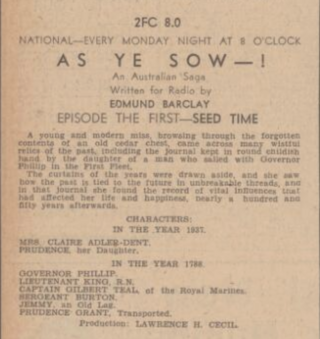
As Ye Sow is a 1937 Australian radio serial by Edmund Barclay. It told the story of six generations of Australians in early colonial Australia.
For the Term of His Natural Life is a 1935 Australian radio serial based on the novel of the same name by Marcus Clarke.
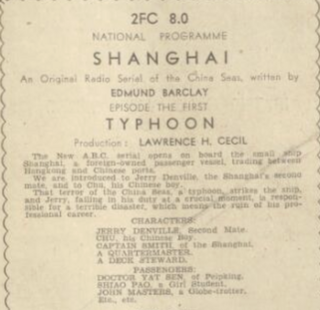
Shanghai is a 1936 radio serial by Edmund Barclay. It ran for 26 weeks.

Salvage is a 1936 Australian radio play by Edmund Barclay about the rescue of a submarine. It was called "one of the most ambitious attempts at dramatic realism ever attempted by the Sydney production department of tire Broadcasting Commission."
Khyber is a 1935 Australian radio serial by Edmund Barclay set in the north west frontier of India. According to contemporary reports "Undoubtedly it has proved one of the most successful serials ever broadcast in Australia or any part of the world."
Mingled Yarn is a 1937 Australian radio play by Edmund Barclay about the life of William Shakespeare. It was broadcast on the ABC for Australian Drama Week.
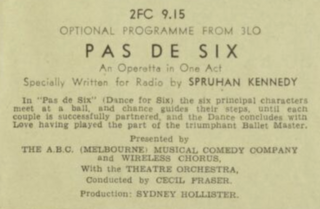
Pas de Six is a 1936 Australian operetta that aired in November 1936. It went for an hour and was recorded in Melbourne.
Merry-Go-Round is a 1936 Australian radio play by Max Afford. It won first prize in the ABC Radio Contest for best play.
Back to School is a 1933 Australian radio revue by Edmund Barclay. It was one of several revues Barclay wrote.
Henry Lawson Stories was a name given to a series of 1937 Australian radio plays on the ABC where Edmund Barclay adapted stories of Henry Lawson.
Into the Light is a 1938 Australian radio serial by Edmund Barclay. It followed on from this success with As Ye Sow.
Dead or Alive is an Australian radio serial by Edmund Barclay. The series was a follow up to Barclay's successful serial Khyber.
Singapore Spy is a 1939 Australian radio drama serial from Edmund Barclay set in Singapore. It was an adventure serial in the vein of his earlier works Khyber and Shanghai.
Valley of the Sky is a 1937 Australian novel by Tarlton Rayment that was based on the life of Angus McMillan.
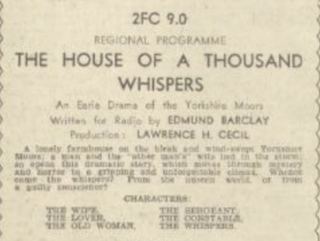
The House of a Thousand Whispers is a 1936 Australian radio play by Edmund Barclay.
Captain Swift is a 1888 stage play by Australian author C. Haddon Chambers. It was turned into a 1920 film Captain Swift and adapted for radio. The play was one of the first plays by an Australian with Australian characters to achieve success overseas.
A Sirius Cove is a 1935 Australian comedy play by Lionel Shave.
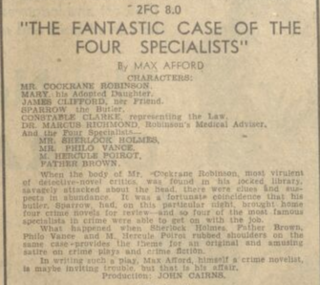
The Fantastic Case of the Four Specialists is a 1937 Australian radio play by Max Afford. The play was one of Afford's best known.
The Twelve Labours of Hercules is a 1938 Australian radio serial by Max Afford based on the legend of Hercules.







